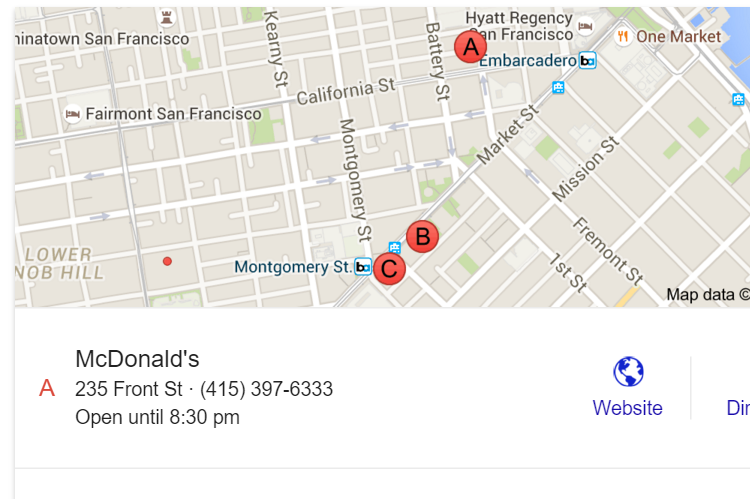by Zipbooks Admin
Local SEO: How to Build Citations

Before I joined ZipBooks, I did business marketing consulting for over 8 years, and I am going to teach you how to build Local SEO citations.
Most marketing companies and consultants follow something called the 80-20 rule. When I did marketing consulting, I would tell a client 80% of what they wanted to know to establish interest and credibility. Then I hoped that they would pay for the other 20%. However, I am going to give you 100% of the information you need to know to put your small business on the map — literally.
Do I need local SEO services?
Not everyone needs local SEO / citation building. Make sure this is something you need before you put any time or effort into it.
|
|
|
|
If you ask a local SEO marketing company whether your business needs their services or not, they will most likely say yes no matter what. They’re happy to do work for your business. However, you might be paying money for something that you don’t need. When you understand local SEO, you’ll be able to decide what you don’t need, what you can do on your own, and what you should delegate. My hope for all small businesses is that when you hire someone, you’ll know enough about marketing that you will be able to request specific services proven to be effective for businesses like yours.
Local SEO: What is it?
Local SEO is the term that marketing companies use to describe the tactics that help a brick and mortar location show up in Google local search results. When a potential client does a local search, Google wants to return a relevant search so that you keep using Google over and over again. The businesses Google wants to display are businesses that a friend might recommend if you asked them. There are going to get the lion’s share of the search traffic and clients.
If Google doesn’t think you are relevant to what people are looking for in their area, you won’t show up on the map. If your company isn’t on that map, you are dead in the water. If you’ve got a physical location that clients are going to visit to buy a product or service, you need local SEO.
What is a citation?
A citation is your business name, full address, and phone number. Established companies have citations all over the internet: on their website, in relevant directories, and even on forums where a past customer might be recommending them to someone else. These citations are good indicators that your business is reputable. Below is an example of a Google search that returns a “local result.” There are more results below this list, but these are the three that most people are going to look at. How does Google figure out relevant searches to show?

How Google decides which companies are relevant
Step 1: Google decides whether the searcher’s intent is local.
In order to keep its users coming back, Google’s search algorithm is doing its darndest to figure out how to provide the very best information to the searcher. To make sure the search results they offer are relevant, Google first tries to determine whether the searcher is looking for a local business.
Here are some of the strategies they use.
- Google checks whether the user included a location in their search terms, like a city or geographic reference point.
- They also try to determine if a user is accessing Google from their phone and also how fast they are moving. Phone users are more likely to be en route to a location that they are looking for.
- Google also separates out a few kinds of purchases that are typically local. For example, if a user wants to buy a car, chances are they’re going to need to go to a physical location.
Step 2: Google finds relevant locations
If Google decides that the local listing search result format is appropriate, Google has to figure out which businesses are in the area. The way they do this is by gathering publicly available information that they find on the internet. Google indexes (or finds and makes a note of) all the sites that seem related to the subject you are searching for that also have a information about their geographical location.
Step 3: Google ranks these relevant locations
Once they have a list of these relevant companies, they decide how to rank them. There are several factors, including the distance to a business from where a user is, the general authority of a business’s website, and the number of positive reviews a business has on various sites. However, one of the most important ranking factors is the number of citations Google can find for a business.
According to Google, the more times your company is referenced on the internet, the more popular and established you are. The business that is mentioned on the most sites probably has the best reputation. So the more citations you have, the more authoritative you appear to Google.
How do I make local SEO work for me?
OK, now that you understand why it is useful, let’s talk about the tactics of what have to be done to get citations. I am going to tell you all the ways to build citations so that you will be able to do it yourself or pay to have it done at the lowest possible cost.
The nitty gritty
The first thing you need to do is make sure that you have a Google Business page. This is the mothership for all your citations and where all your reviews will live. Once you’ve got a Google Business page, you’ve got a few options to choose from.
Option 1: Hire a marketing firm.
You can hire a firm like Whitespark. They will build citations for you at about $4/citation.
Option 2: Do it yourself.
At the bottom of the post is a list of popular directories. All you have to do is create an account for each site and put in the information for your company. It’s mind-numbing, but it is honest work.
Here are a few things to look out for when you are doing the citation work, as well as things to check when someone else is doing the work for you.
- The name of the company, address, and phone number should be exactly the same on all your citations. This means even down to the way your express the suite number in your address.
- Your citations should be consistent with your website. The company name, address, and phone number for your citation should be exactly the same as those on your website.
- When you show up in a local search, Google will pull your information from your Google Business page so make sure to fill out your profile all the way. Don’t be stingy with pictures, either. People love pictures.
Option 3: Outsource — Getting all your citations for 50 cents / citation.
You can outsource all of your citations at a very low cost, which is how I build all my citations. I like to get paid a couple hundred dollars and outsource the work for $50 and keep the difference. That is the recipe for a gravy train life with biscuit wheels. 😉
Step-by-step instructions for outsourcing:
- Create a job.
- Create an upWork account.
- Job title: I need to build Local SEO citations
- Job description: “If you know how to build SEO citations, please respond.”
- Screen applicants. Find someone at oDesk that builds citations.
- Good reviews – They should have 4.9+ stars
- Hire an individual not a contractor. Contractors make it more expensive.
- Hire someone with a high “Job Success” rate.
- Hire someone with a lot of hours worked.
- Negotiate pay. $50 for 100 citations is probably what I would shoot for.
- Make $50 payment into escrow so your contractor know you are serious about paying them. (Don’t worry, you can get the money back.)
- Fill out a form (example Excel form) with all the information.
- Send it to the contractor.
- They will send a you report.
- They’ll send you links to where all the citations are found.
- They’ll send you the username and password to the directory.
- Check the reviews to make sure they are good.
- Release payment
Let me know how it works out for you
Now that I’ve given you all my secrets, I’d love to hear how about your local SEO adventures. You should have the tools to do your local SEO yourself. But now you can also strategically outsource it to others to avoid paying more than is really necessary.
List of directories I promised:
| Google Places (aka Google+ Local) |
| Yellowpages.com |
| Yelp |
| Local.com |
| WhitePages.com |
| Manta |
| SuperPages |
| CitySearch |
| Patch |
| City-Data |
| MerchantCircle |
| Yellowbook.com |
| Yahoo Local |
| Mapquest |
| Topix |
| DexKnows |
| Yellow.com |
| BBB.org |
| ServiceMagic |
| Angieslist |
| AreaConnect |
| Foursquare |
| AmericanTowns |
| BizJournals |
| LocalGuides |
| 411.com |
| Yellowpages.aol.com |
| Insider Pages |
| MagicYellow |
| Hotfrog.com |
| Mojopages |
| Switchboard |
| Demandforce |
| MojoPages |
| Bundle |
| Metromix |
| Yellowbot |
| Kudzu |
| ShowMeLocal |
| ChamberofCommerce |
| LocalPages |
| HopStop |
| YellowMoxie |
| Phonenumber.com |
| Best of the Web Local |
| Yellowise |
| GetFave |
| Tupalo |
| ZipLocal |
| EZLocal |
| CitySquares |
| USCIty.net |
| LocalDatabase |
Good luck!





